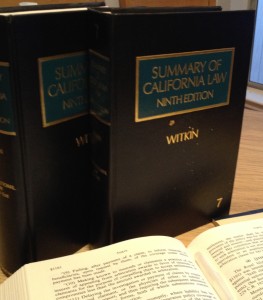Negligence Based on a Law or Statute: Negligence Per Se
NEGLIGENCE “PER SE” – A DOCTRINE ALLOWING THE DEFENDANT’S VIOLATION OF A STATUTE TO REDUCE THE PLAINTIFF’S BURDEN OF PROOF
Negligence is a legal doctrine which imposes liability on defendants for failure to comply with a legal duty (a “breach”) which causes damage to people or property. The four elements of a negligence claim are:
1. Existence of a duty (which applies to the defendant)
2. A breach of that duty by the defendant.
3. Causation (the duty actually caused the harm the plaintiff(s) or their property suffered)
4. Damages – to a person (usually the plaintiff) or property.
In order to prevail on a negligence claim, the plaintiff must prove the existence of all four elements, and meet the relevant burden(s) of proof, under circumstances where the defendant cannot prove any defenses which would eliminate liability to the plaintiff.
“Negligence per se” is a legal doctrine which creates (or allows) a presumption that the defendant (a) had a duty, and (b) breached it. Where the doctrine applies, the plaintiff’s burden of proof is reduced to proving causation and damages.
Negligence per se requires a negligence action predicated on the defendant’s violation of an applicable statute, ordinance, or public safety regulation. Not all statutes can be used to establish negligence per se, however, and plaintiffs should consult an attorney experienced in handling negligence matters to determine whether or not the statute the defendant violated might support a claim of negligence per se.
NEGLIGENCE PER SE IS A DOCTRINE WHICH AFFECTS THE BURDEN(S) OF PROOF
Negligence per se is codified in California Evidence Code § 669 codifies the “negligence per se” doctrine
669, which states that a person’s failure to exercise due care is legally presumed if:
1. The person violated an applicable statute, ordinance, or regulation.
2. The conduct which violated the statute proximately caused death or injury to a person or
damage to property.
3. The death, injury, or damage was “of the nature which the statute, ordinance, or regulation was designed to prevent; and
4. The injured party (normally the plaintiff) whose person or property was damaged is “one of the class of persons for whose protection the statute, ordinance, or regulation was adopted” — in other words, if the plaintiff was part of the group the law was designed and/or intended to protect.
The doctrine of negligence per se is not an “automatic win” for the plaintiff. It creates a presumption, which can be rebutted (disproven) by the defendant or the defendant’s attorney. Defendants can rebut the presumption by proving that: (a) the person violating the statute, ordinance, or regulation acted as a reasonable, law-abiding person would have acted under similar circumstances, (b) the person who violated the statute, ordinance, or regulation was a child who exercised the degree of care ordinarily shown by children of similar age and maturity (provided the child was not engaged in an “adult activity”–as defined by law), or (c) by proving another applicable defense to negligence liability.
If you believe you have a negligence-based claim against any person or entity, consult an attorney promptly. Do not rely on this or any other article to evaluate your legal rights and claims.
Delay could damage your claims and legal rights.
***
DISCLAIMER: This article is intended for informational purposes only, does not constitute legal advice to any person or entity, and does not create an attorney-client relationship with any person or entity. Negligence is a complex legal topic, and no single article can provide complete or comprehensive coverage or information about this or any other legal topic or issue. Your personal liability may differ, based on your individual facts and circumstances. If you believe you have a legal claim or issue, or wish to know more about your individual rights, consult an experienced attorney without delay.















